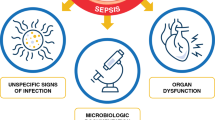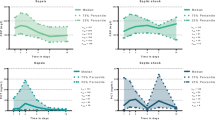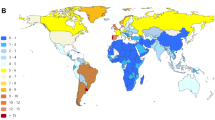Abstract
Background
Advanced age is an important factor affecting Clostridioides difficile infection (CDI) risk and outcome. While fever and leukocytosis are prominent findings in young individuals with CDI, they are usually blunted in the elderly. Furthermore, chronic kidney disease often exists among this population prior to the CDI episode onset.
Aim
We aimed to examine whether the accepted definition of severe CDI (leukocytosis ≥ 15,000 cells/μl or serum creatinine > 1.5 mg/dl) predicts poor outcomes in the elderly.
Methods
All CDI hospitalized individuals between January-2013 and May-2020 were included. The study population was dichotomized into older group (≥ 65 years) and younger group (< 65 years). Primary composite outcome was 30-day mortality, colectomy due to severe colitis, or intensive care unit admission. The older group was divided according to the primary outcome to evaluate the effect of CDI severity criteria.
Results
The study included 853 patients. Of them, 571 were in the older group and 282 in the younger one. The primary outcome was significantly more common in the older group (93/571, 16% vs. 31/282, 11%; p = 0.04). Ninety days mortality was significantly higher in the older group [116/571, 20% vs. 30/282, 11%; p < 0.01]. In multivariate analysis, accepted CDI severity criteria were not significantly associated with poor outcomes (odds ratio [OR] = 1.2, 95% confidence interval [CI] 0.7–2.2, p = 0.5). Advanced dementia and low serum albumin were significant predictors of poor outcomes (OR = 3, 95%CI 1.5–6, p = 0.002 and OR = 3.1, 95%CI 1.7–5.8, p < 0.01).
Conclusion
The accepted definition of CDI severity was not useful in predicting CDI poor outcomes in older adults. In this population, we suggest advanced dementia and low albumin among others as CDI severity markers.
Similar content being viewed by others
Data availability
Data and materials are available.
Code availability
Not applicable.
References
Keller JM, Surawicz CM (2014) Clostridium difficile infection in the elderly. Clin Geriatr Med 30:79–93
Gerding DN (2009) Clostridium difficile 30 years on: what has, or has not, changed and why? Int J Antimicrob Agents 33:S2-8
Kyne L, Hamel MB, Polavaram R et al (2002) Health care costs and mortality associated with nosocomial diarrhea due to Clostridium difficile. Clin Infect Dis 34:346–353
Hakim FT, Gress RE (2007) Immunosenescence: deficits in adaptive immunity in the elderly. Tissue Antigens 70:179–189
Ginaldi L, Loreto MF, Corsi MP et al (2001) Immunosenescence and infectious diseases. Microbes Infect 3:851–857
Cooper GS, Shlaes DM, Salata RA (1994) Intra-abdominal infection: differences in presentation and outcome between younger patients and the elderly. Clin Infect Dis 19:146–148
Chassagne P, Perol MB, Doucet J et al (1996) Is presentation of bacteremia in the elderly the same as in younger patients? Am J Med 100:65–70
Finkelstein MS, Petkun WM, Freedman ML et al (1983) Pneumococcal bacteremia in adults: age-dependent differences in presentation and in outcome. J Am Geriatr Soc 31:19–27
Tiruvoipati R, Ong K, Gangopadhyay H et al (2010) Hypothermia predicts mortality in critically ill elderly patients with sepsis. BMC Geriatr 10:70
Wester AL, Dunlop O, Melby KK et al (2013) Age-related differences in symptoms, diagnosis and prognosis of bacteremia. BMC Infect Dis 24:346
Bauer MP, Hensgens MP, Miller MA et al (2012) Renal failure and leukocytosis are predictors of a complicated course of Clostridium difficile infection if measured on day of diagnosis. Clin Infect Dis 55:S149–S153
Louie TJ, Miller MA, Mullane KM, et al. OPT-80-003 Clinical Study Group (2011) Fidaxomicin versus vancomycin for Clostridium difficile infection. N Engl J Med 364:422–31.
Cornely OA, Crook DW, Esposito R, et al. OPT-80-004 Clinical Study Group (2012) Fidaxomicin versus vancomycin for infection with Clostridium difficile in Europe, Canada, and the USA: a double-blind, non-inferiority randomized controlled trial. Lancet Infect Dis 12:281–9.
Carlson TJ, Gonzales-Luna AJ, Nebo K et al (2020) Assessment of kidney injury as a severity criteria for Clostridioides Difficile infection. Open Forum Infect Dis. https://doi.org/10.1093/ofid/ofaa476
Debast SB, Bauer MP, Kuijper EJ, European Society of Clinical Microbiology and Infectious Diseases (2014) European Society of Clinical Microbiology and Infectious Diseases: update of the treatment guidance document for Clostridium difficile infection. Clin Microbiol Infect 20:1–26
Sartelli M, Di Bella S, McFarland LV et al (2019) 2019 update of the WSES guidelines for management of Clostridioides (Clostridium) difficile infection in surgical patients. World J Emerg Surg 14:8
Trubiano JA, Cheng AC, Korman TM et al (2016) Australasian Society of Infectious Diseases updated guidelines for the management of Clostridium difficile infection in adults and children in Australia and New Zealand. Intern Med J 46:479–493
Surawicz CM, Brandt LJ, Binion DG et al (2013) Guidelines for diagnosis, treatment, and prevention of Clostridium difficile infections. Am J Gastroenterol 108:478–498
Di Masi A, Leboffe L, Polticelli F et al (2018) Human serum albumin is an essential component of the host defense mechanism against Clostridium difficile intoxication. J Infect Dis 22:1424–1435
Araos R, Andreatos N, Ugalde J et al (2018) Fecal microbiome among nursing home residents with advanced dementia and Clostridium difficile. Dig Dis Sci 63:1525–1531
Haran JP, Bucci V, Dutta P et al (2018) The nursing home elder microbiome stability and associations with age, frailty, nutrition and physical location. J Med Microbiol 67:40–51
Milani C, Ticinesi A, Gerritsen J et al (2016) Gut microbiota composition and Clostridium difficile infection in hospitalized elderly individuals: a metagenomic study. Sci Rep 11:25945
Funding
None.
Author information
Authors and Affiliations
Contributions
Study concept and design: AA, BJ contributed to study conception and design; acquisition, analysis or interpretation of data: all authors; drafting the manuscript: AA drafts the manuscript; critical revision of the manuscript for important intellectual content: all authors.
Corresponding author
Ethics declarations
Conflict of interest
The authors declare that they have no conflict of interest.
Ethics approval
The study protocol was approved by the hospital ethics committee.
Statement of human and animal rights
This article does not contain any studies directly involving human participants, as it is a review of data already collected in an electronic database.
Consent to participate
Not applicable.
Consent for publication
Not applicable.
Additional information
Publisher's Note
Springer Nature remains neutral with regard to jurisdictional claims in published maps and institutional affiliations.
Supplementary Information
Below is the link to the electronic supplementary material.
Rights and permissions
About this article
Cite this article
Atamna, A., Babich, T., Margalit, I. et al. Does accepted definition of Clostridioides difficile infection (CDI) severity predict poor outcomes in older adults?. Aging Clin Exp Res 34, 583–589 (2022). https://doi.org/10.1007/s40520-021-01953-5
Received:
Accepted:
Published:
Issue Date:
DOI: https://doi.org/10.1007/s40520-021-01953-5




